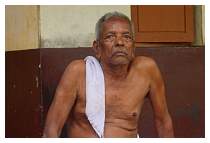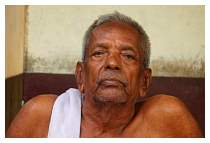Late Narayanan Nair- a talanted artist of Tholpavakoothu
a life dedicated to farming and TOLPAVA, the unique shadow puppet play of Kerala |
| Born 26-09-1926, introduced to Tolpava, the ancient and more than 300 years old shadow puppet theatre of Kerala by his father Panchu Nair and trained in the art form in Gurukulam style since the age of 12, he is now the only surviving master of Tolpava to recite about 3000 verses of the complete Tamil epic Kamba Ramayana with its 6 book's Bala Kandam, Ayodha Kandam, Aranya Kandam, Kiskindha Kandam, Sundara Kandam, Yuddha Kandam'.................................. |
 | |
| Festivals where Narayanan Nair is the chief of the Tolpava Koothu: | |||
| Kavu | Location | days | Malayalam month |
| Puthanalikal Kavu Kayiliyad Kavu Kadaparambathu Kavu Mulayam Kavu Ariyan Kavu | Cherpelassery Kayiliyad Ongaloor Kulukallur Kavalappara | 28 21 41 21 21 | Makaram/Kumbham Kumbham Medam Medam Medam/Meenam |
"I had been very touched to watch him during the last festival at Aryankavu, Kavalappara, reciting with his distinguish and sonorous voice verses of the Kamba Ramayana from 10 pm onw2ards, 21 days every night, and climbing down on his own in the wee morning hours between 6 and 7 am and in the fragility of his age to pay at last his reverence to the deity."
-- Prem Manasvi
Written by Prem Manasvi
manasvi@mykerala.net


